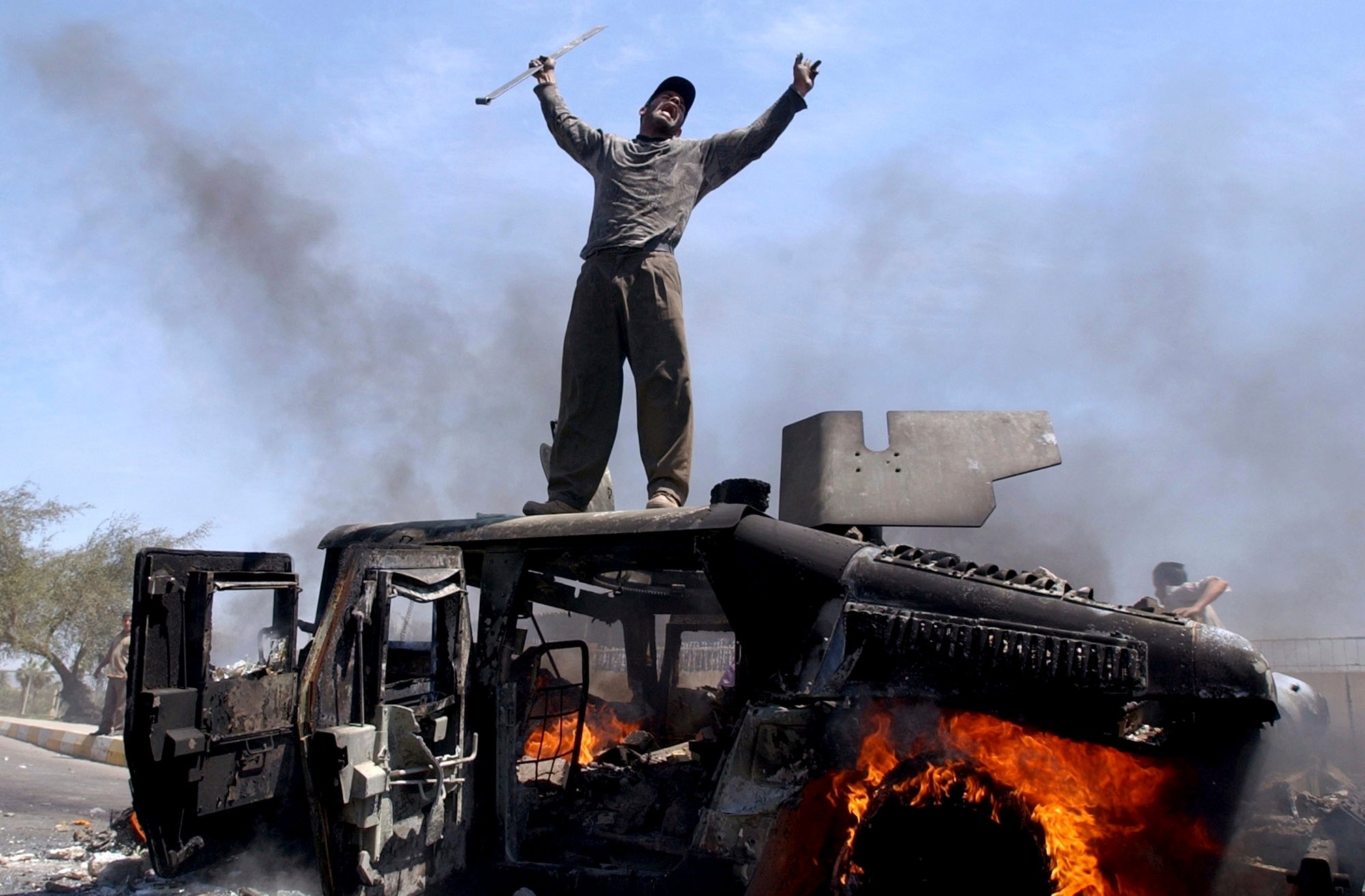‘We called it liberation, but the Iraq invasion was an occupation’: A tale of regret from Baghdad
One Iraqi-American citizen pushed for the US-led toppling of Saddam Hussein. Twenty years later, he speaks to Borzou Daragahi about his thoughts now


It was the summer of 2004 on one of those boiling hot days in Baghdad. Mazin Al-Eshaiker was stuck in a major traffic jam in the city’s Karrada district. Assassinations. insurgent attacks and kidnappings were rampant, so he had bought a beat-up car to drive around the city and keep a low profile.
Suddenly he saw an opening ahead and made a quick U-turn. That’s when the American soldiers aiming their assault rifles descended on him, One yelled at him to get the eff out. An Iraq who had spent the better part of his life in southern California, his reaction was to curse back.
“You’re American? the astonished American soldier replied. ”What are you doing here?”
“I’m an Iraqi-American,” he answered back. “What are you doing here?
What Elshaiker did not tell the soldier but knew in his heart was that the American was there in part because of him, and the work he had done years earlier setting the United States and the United Kingdom on a path toward an invasion of Iraq that would alter the course of Iraq and the world.
Elshaiker had helped write the 1998 Iraq Liberation Act that called for the toppling of Saddam Hussein’s regime. He was among the Iraqi associates of UK-based exile Ahmad Chalabi who had cheered US plans to topple the Baghdad regime in the months before the invasion 20 years ago this week.
The invasion, occupation and subsequent and ongoing violence caused unimaginable pain, despair and regret for Iraq, and is now generally regarded by Americans, Brits and Iraqis as a grave mistake.
“Most of the people who lived in Iraq under Saddam would prefer to go back to those days,” he says in a phone interview from Baghdad. “Sunni, Shia, Kurds—all think they had a better life under Saddam.”
The ups and downs of the last 20 years also shook Elshaiker’s beliefs about both of his countries. Repeatedly he has questioned his own actions, and wondered whether his dream of a peaceful and democratic Iraq was even possible.
He arrived in the Iraqi capital 20 years ago, after spending much of his life in exile, as the American occupation began and the city continued to smoulder.
“We didn’t call it an invasion; we called it a liberation—the liberation of the Iraqi people from the slavery of Saddam,” he says. “In the end, though, it was an occupation.”
He eagerly joined efforts to help rebuild Iraq, using his experience and training as a communications engineer to build the country’s mobile networks . In those first years, even until the February 2006 destruction of the Shia shrine at Samarra that set off the country’s sectarian civil conflict, there remained still a glimmer of hope that Iraq would pull through.
It wouldn’t. Things would get far worse before they got any better.
He watched helplessly as friends and colleagues were kidnapped or murdered, and retreated deeper into the isolation of Baghdad’s fortress-like Green Zone. One fellow engineer was kidnapped and murdered by Shia militias who thought he was Sunni. In another case, his driver was a Sunni married to a Shia and was ordered by an armed group to divorce his wife. He refused. Insurgents pulled up to his house and shot his body up with dozens of bullets
Elshaiker watched as the country descended into despair and horror, and then re-emerged after the surge into something resembling calm, only to be plunged back into violence and chaos with the 2014 capture of Mosul by Isis.
He entered the rough and tumble of Iraqi power and politics. He helped play a major role in the expansion of Iraq’s private sector. He says ordinary Iraqis prefer the security of state and public employment over the economic messiness of post-Saddam Iraq.
“Before Iraqis all worked for the state,” he says. “But now they have to make a choice between public or private. Iraqis say that before we had one corrupt guy. Now we have thousands of corrupt guys.”
Ironies abound. Elshaiker was shortlisted as a possible compromise prime minister. The Iraqi American was championed by none other than Moqtada al-Sadr, the anti-American cleric whose supporters fought against American soldiers. Later, in 2019, Elshaiker supported protests by youth against the Baghdad establishment. Twenty years after he moved back to the country of his birth, he has gone native, railing against corruption, the lack of electricity and failing public services.
Looking back, he still has a hard time concluding that it was all a mistake, that Americans, Brits and their coalition partners never should have even considered transforming Iraq into a democracy.
“I don’t regret helping out with the Iraq Liberation Act,” he says. “The thing that was missing was the day after. In all the meetings I had nobody talked about the day after. There was no plan. And then it got more and more complicated.”
But even if the Americans had no business trying to transform Iraq, he says he can’t help looking at the past 20 years from an Iraqi perspective as well.
“We had a great opportunity and we missed the opportunity,” he says.
Join our commenting forum
Join thought-provoking conversations, follow other Independent readers and see their replies
Comments
Bookmark popover
Removed from bookmarks